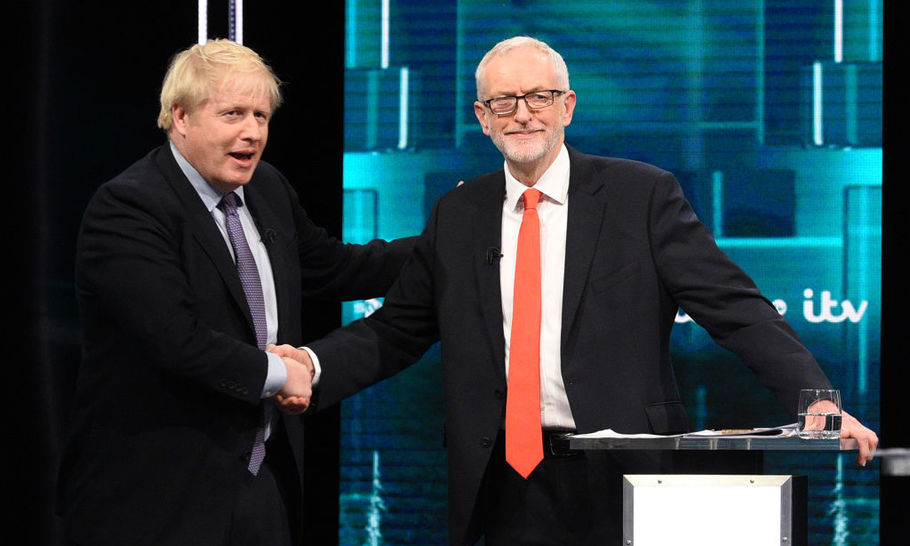Voters have the choice of a liar and a hypocrite — but only one of them loves his country

(Photo by Jonathan Hordle//ITV via Getty Images)
This general election campaign has so far been largely about the things that we know we know about the party leaders, their programmes and slogans. It could still also be affected by things we know that we do not know, such as the turnout and the weather. But, to quote Donald Rumsfeld, “there are also unknown unknowns — the ones we don’t know we don’t know”. These are the factors that tend to cause election surprises.
What might the unknown unknowns be this time? There are three areas that have a history of upsetting the apple cart: demographics, deception and disgust.
Firstly, demographics. The electorate is constantly changing; hence parties are always firing their messages at a moving target. New groups emerge, often unnoticed by the pollsters and psephologists. Which hitherto obscure category of voter might be about to decide this 2019 contest?
We do know that tribal voting habits have been weakened by Brexit and that this will lead to unprecedented volatility in allegiances. As James Bickerton wrote here last week for TheArticle, Labour is no longer the natural party of the working class: that role has been usurped by the Tories and their clear “get Brexit done” mantra. Sir John Curtice writes in the Times that Boris Johnson’s ability to bridge the class divide could deliver him victory, but that keeping “the party’s new coalition together will not be easy”.
What, though, if there are unforeseen consequences of this wholesale abandonment by mainly northern working-class voters of Jeremy Corbyn’s party of far-Left activists and middle-class public sector interest groups? Is it not possible, even likely, that other groups will not bother to vote for the Tories because they fear that the party no longer represents them? A middle-class protest that embraces Remainers, the self-employed (who are treated as second-class citizens in today’s Britain) and others who feel neglected and overlooked could yet deprive the Conservatives of their majority.
The second unknown unknown is deception. Voters do not always tell pollsters, let alone canvassers, the truth about their intentions. National figures are always to some extent deceptive — this is a known unknown — but so too may be the results of constituency polling. Many marginals are known to hang in the balance, but this time nobody knows for sure which seats are the marginals.
Indeed, some of the safest Labour and Tory seats in the country may be in play. Two of the party leaders — the Prime Minister and Jo Swinson — are potentially in danger. The youngest section of the electorate, students and others who have never voted before, are particularly hard to predict. Yet they hold the balance in many urban constituencies — if they bother to vote. Overwhelmingly, they tell the pollsters that they hate the Tories. But does this necessarily mean that they will vote Labour?
This brings us to the third category of unknown unknowns: disgust. In the privacy of the polling booth, many voters will be swayed by a visceral loathing of one party or another. Some cannot bear Boris Johnson: not only his character, but his appearance and his accent. Others cannot resist him, for the same reasons.
When asked by Sophie Ridge on Sunday whether riding his bicycle on the pavement was really the naughtiest thing he had ever done, he gave a classic Boris Johnson reply: “No, no, it was a very careful rubric. What you said was the naughtiest thing I was prepared to admit.” A liar, then; but an honest liar.
The same applies to the other leaders: Corbyn’s squint, Swinson’s voice. What irritates one voter, charms another. Such feelings may override self-interest: “I just couldn’t bring myself to vote for that man.”
In the 2019 election, the disgust factor may prove to be more important than at any time since the Thatcher era. The polling evidence suggests that non-Jewish voters do not care much about Labour’s anti-Semitism, for example. Some groups — hardline Leftists and Islamists — may even privately agree with it. That is why Corbyn and his colleagues have been so reluctant to apologise or even acknowledge that it exists. The same applies to their lack of patriotism and past support for terrorists.
Yet when people come to vote, such things may loom larger than the questionnaires and focus groups reveal. The disgust factor comes into play with a vengeance. Never before has the electorate been asked to vote for a party and a potential prime minister who are associated with “the oldest hatred” and with those who hate this country.
Voting is an act of will, an active choice. We may hazard a guess at what goes on in the minds of the people when they vote, but what takes place in their hearts is much harder to discern. It is possible that hitherto hidden demographic forces will emerge to ambush the Tories. It is possible that seemingly loyal supporters will desert them and derail the Boris bandwagon. These unknown unknowns may matter a great deal — or not at all.
But the most potent of the unknown unknowns is surely the disgust factor. If, as may be surmised, very large numbers of people cannot bring themselves to vote for Jeremy Corbyn because they are disgusted by his conduct and his character, then the Labour Party might be in for much nastier surprise than most of the predictions suggest. Voters are being asked to choose between a liar and a hypocrite. Only one of them loves his country. It’s not really a difficult choice.





